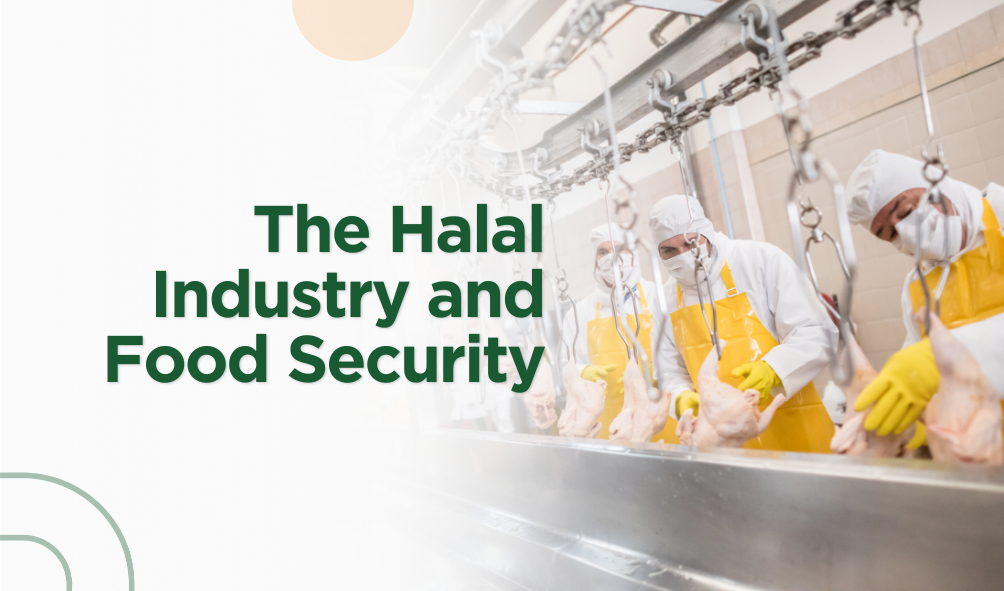The Halal Industry and Food Security
As the largest Muslim-majority country in the world, Indonesia has a significant responsibility to ensure that the food needs of its population are adequately met in accordance with Islamic principles. The halal industry is not only a part of the cultural and religious fabric but also a potential economic sector that supports national food security. In the face of increasingly complex globalization challenges, the relationship between the halal industry and food security has become a more relevant and urgent topic.
The Development of the Halal Industry in Indonesia
With the increasing awareness of the importance of halal products, this industry has experienced significant growth in Indonesia. According to the Global Islamic Economy Report (2023), the halal product market in Indonesia is projected to grow to USD 218.8 billion by 2024, covering food, cosmetics, pharmaceuticals, as well as fashion and lifestyle. This figure places Indonesia as one of the leading markets for halal products globally .
The Indonesian government has initiated various strategic steps to support the development of the halal industry, including strengthening regulations through Law No. 33 of 2014 on Halal Product Assurance and establishing the Halal Product Assurance Agency (BPJPH) . Additionally, Indonesia has begun developing halal industrial zones, such as in Sidoarjo, East Java, which is designed to be a center for halal product manufacturing and exports .
Beyond regulations, consumer awareness and preference also play a critical role in driving the industry’s growth. More people are choosing halal products not only for religious reasons but also for the quality and safety offered by these products. This is evident from the increasing demand for halal products across various sectors, including food, pharmaceuticals, and cosmetics .
The Relationship Between the Halal Industry and Food Security
Food security is not only about the availability of food but also about its accessibility, quality, and sustainability. In this context, the halal industry makes a significant contribution by ensuring that Muslims in Indonesia have access to food products that are not only safe for consumption but also comply with halal standards .
The growth of the halal industry also stimulates innovation in food technology, which includes the development of organic and environmentally friendly products. These products not only meet the needs of health-conscious consumers but also support environmental sustainability. For instance, the halal organic farming sector is growing in response to consumer demand for pesticide-free and chemical-free products that comply with halal principles .
Furthermore, the integration of the halal industry with the agriculture and livestock sectors can enhance the efficiency of domestic food production. By applying halal principles, such as in animal slaughter methods and food processing, Indonesia can improve the quality of local food products while expanding its market reach internationally .
Challenges and Opportunities in the Era of Globalization
Globalization has a significant impact on the dynamics of the halal industry and food security in Indonesia. On the one hand, globalization facilitates access to international markets, opening up opportunities for Indonesia’s halal products to compete globally. In 2023, Indonesia’s halal product exports recorded a significant increase, with export values reaching USD 10 billion, largely dominated by food and beverage products .
However, globalization also brings major challenges, particularly in terms of price and quality competition. Cheaper imported products that may not meet halal standards pose a threat to local producers. Therefore, strict regulation and oversight are crucial to maintaining the integrity of the domestic halal market. The government must ensure that every product entering the Indonesian market meets established halal standards .
Another emerging challenge is the rising cost of raw materials and climate change, which affects food production. Indonesia must find ways to improve the efficiency of food production and strengthen domestic food security through technological innovation and better resource management. Developing infrastructure that supports the distribution of halal products across the country is also vital to ensuring sustainable food security .
Strategies to Strengthen the Halal Industry and Food Security
To address challenges and leverage opportunities, a holistic and integrated strategy involving the government, industry players, and the public is required. Some strategies that can be implemented include:
- Enhancing Production Capacity and Quality: The development of innovative and sustainable production technologies is essential to improving the competitiveness of Indonesia’s halal products in the global market. The government needs to encourage research and development (R&D) in the agriculture, livestock, and halal food sectors .
- Strengthening Halal Regulation and Certification: The implementation of stringent halal standards must be accompanied by consistent and transparent oversight. The government should strengthen the role of BPJPH and ensure that every product circulating in the market has met the applicable halal standards .
- Diversifying Export Markets: In addition to strengthening the domestic market, Indonesia should also identify new overseas markets with significant potential for halal products, such as countries in Africa and South America that are beginning to show interest in halal products .
- Consumer Education and Awareness: Raising consumer awareness about the importance of halal products, not only from a religious perspective but also in terms of health and sustainability. Effective educational campaigns can help increase the demand for quality halal products .
- International Cooperation: To expand the reach of halal markets, Indonesia needs to establish international cooperation with other countries in the development of global halal standards. This will make it easier for Indonesia’s halal products to be accepted in international markets .
Conclusion
The halal industry plays a crucial role in supporting Indonesia’s food security, particularly in the context of globalization. With the right strategies, such as improving production quality, strengthening regulations, and diversifying markets, Indonesia can not only meet the demand for halal and quality food for its people but also become a major player in the global halal market. Success in this industry will significantly contribute to national food security and the economy while reinforcing Indonesia’s position as a leading country with a strong halal industry.
Also read:What Is The Ruling on Stocks in Islam, Which Includes Halal and Haram Assets?

References
- Global Islamic Economy Report. (2023). State of the Global Islamic Economy Report 2023/24. Dubai: DinarStandard.
- Halal Product Assurance Agency. (2023). Development of Halal Certification in Indonesia. Jakarta: BPJPH.
- Indonesian Ministry of Industry. (2023). Development of Halal Industrial Zones in Indonesia. Jakarta: Ministry of Industry.
- Indonesian Central Bureau of Statistics. (2023). Indonesia’s Halal Product Export Data. Jakarta: BPS.
- Indonesian Ministry of Agriculture. (2023). Strategies for Improving the Efficiency of Halal Food Production. Jakarta: Ministry of Agriculture.







